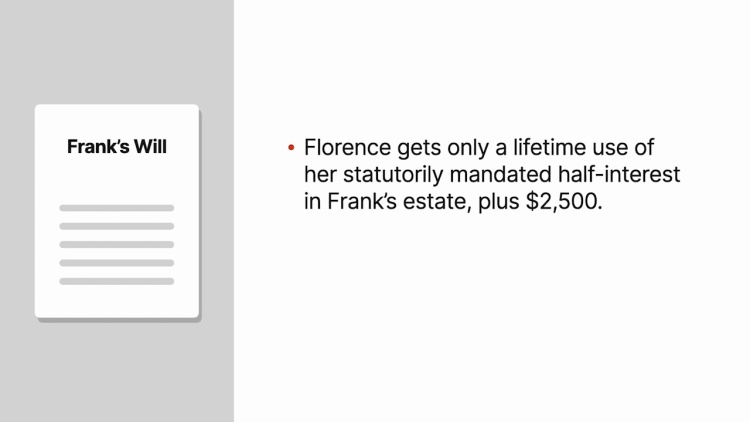In re Honigman’s Will
New York Court of Appeals
8 N.Y.2d 244, 168 N.E.2d 676 (1960)
- Written by Rose VanHofwegen, JD
Facts
After 40 years of childless but apparently happy marriage, Frank Honigman became obsessed that his wife Florence (plaintiff) was having an affair with a longtime mutual friend. Frank publicly and repeatedly told friends and strangers alike that Florence was unfaithful and believed unlikely scenarios such as hearing men running through his house and Florence hauling men up to her upstairs window using bedsheets. Frank evidently realized he was delusional as he said he was “sick in the head,” knew something was wrong with himself, and went to a doctor and a psychiatrist, who could not help. One month before he died, Frank had an attorney prepare a will that cut off Florence, leaving her use for life of just over the minimum one-half statutory share, then directed distribution of the property to Frank’s relatives. Frank willed the remainder of his estate directly to siblings, explaining to his attorney that Florence was unfaithful and had enough money, and that he wanted to support his relatives in Germany instead. When the will was probated, Florence objected on the ground that Frank was suffering from an insane delusion that precluded testamentary capacity when he cut her out of the will. The jury found Frank was not of sound mind when he executed the will, and the court refused to probate it. Frank’s relatives appealed. The appellate court reversed, directing the lower court to probate the will. Florence appealed to New York’s highest court.
Rule of Law
Issue
Holding and Reasoning (Dye, J.)
Dissent (Fuld, J.)
What to do next…
Here's why 907,000 law students have relied on our case briefs:
- Written by law professors and practitioners, not other law students. 47,100 briefs, keyed to 996 casebooks. Top-notch customer support.
- The right amount of information, includes the facts, issues, rule of law, holding and reasoning, and any concurrences and dissents.
- Access in your classes, works on your mobile and tablet. Massive library of related video lessons and high quality multiple-choice questions.
- Easy to use, uniform format for every case brief. Written in plain English, not in legalese. Our briefs summarize and simplify; they don’t just repeat the court’s language.





